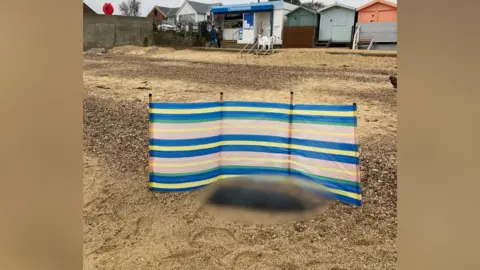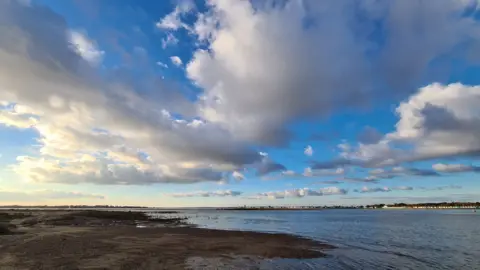'Headless' seals wash up on Essex coast
 Tendring Seal Watch
Tendring Seal WatchThe bodies of multiple seals have washed up on the shores of north Essex, according to reports.
The BBC has been told the animals were found at several beach locations in Tendring, as well as one in Felixstowe, Suffolk.
According to a post from Tendring Seal Watch, seven seals were found over a period of three days - all of them headless.
Several other organisations have told the BBC the exact number of seals was unclear, and the condition of the seals' bodies was most likely due to natural causes.
'Missing their heads'
The dead seals were reported at Dovercourt, Holland-on-Sea, Point Clear, Clacton-on-Sea and two at Walton-on-the-Naze.
Any dead marine animals found stranded on a beach are handled by the UK Cetacean Strandings investigation Programme (CSIP).
 Stuart Woodward/BBC
Stuart Woodward/BBCIts project manager Rob Deaville, from the Zoological Society of London, said: "It is possible that some reports are double strandings of the same individual, but there does appear to be at least three to four individuals, some of which are missing their heads".
Mr Deaville said photos of the bodies suggested the damage was "most likely natural in origin" and could have been related to predators or scavenging.
"At this stage, there is no conclusive evidence that the damage is manmade in nature," Mr Deaville told the BBC.
"As context, the CSIP receives numerous reports of headless seals each year around the UK, none of which appear to be related to direct human impacts," he added.
'Part of the natural process'
Tendring District Council – which is responsible for removing dead animals from its beaches – told the BBC it received four reports of a headless seal being washed up on its beaches.
"Our officers have checked the locations reported to us, and only one seal was found in situ on 21 February – near Walton's Eastcliff, which was due to be removed on Friday afternoon," a spokesperson for the council said.
"It is understood that due to the weight of a seal's head, and its neck being the weakest part of their body, carcasses can frequently be washed up headless, especially if there have been rough seas," they added.
The council also explained that it was "not always a simple matter" to remove a dead animal from a beach, depending on its size, state of decomposition, health and safety risks and the potential need for machinery to help move the animal and dispose of it.
Any dead strandings on beaches should be reported to the CSIP on 0800 652 0333, whilst any live stranded animals should be reported to the RSPCA or the British Divers Marine Life Rescue.
Follow Essex news on BBC Sounds, Facebook, Instagram and X.
